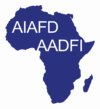Abidjan, Côte d’Ivoire, March 19, 2021 — Given the huge impact of the coronavirus pandemic and other disruptions of the social, economic, and environmental system, proactive organizations are redefining the purpose of their existence and focusing their actions on sustainability to deliver on broader societal goals of ensuring that beyond profit, organizations matter: that people, planet, and profit are embedded in the contemporary development equation. For development finance institutions (DFIs), embedding sustainability is of prime relevance in achieving the sustainable development goals (SDGs).
It is against this background that the Association of African Development Finance Institutions (AADFI) organized its 2021 Consultative Forum for Human Resource (HR) Professionals in African DFIs, from March 17 to 19, 2021, on the theme: “Empowering Human Capital Sustainability in African DFIs”, and discussed the relevance and roles of HR professionals in achieving sustainability agenda in DFIs across Africa.
The Forum acknowledged the negative impact of Covid-19 in DFIs operations, but also noted that the pandemic has created opportunities to speed up the transformation of the future of work. The progress made by institutions in digitalizing their work processes, adopting remote and flexible working systems without compromising their performance, among others, are some of the positive consequences of the coronavirus pandemic. The webinar was attended by 65 participants, from 26 national and regional DFIs, across 21 African countries.
The opening remarks of the three-day event were delivered by Mr. Abdelouahab Boushaba, AADFI Regional Representative for North Africa and Deputy CEO of Groupe Crédit Agricole du Maroc/Tamwil El Fellah.
The remarks raised critical questions on the future of DFIs, particularly national DFIs, in the face of unpredictable phenomena like pandemics, as well as, the volatility, uncertainty, complexity, and ambiguity of the current global business environment. He suggested that the HR professionals will have to ensure that the right human capital is attracted, with emphasis on investing in the employee to develop skills to lead change and remain resilient in the post-covid-19 era.
Furthermore, Mr. Boushaba, while officially closing the high-level event on March 19, 2021, reemphasized that the contemporary HR professionals in DFIs needed to be agile, maintain and sustain employees’ development on sustainability, and develop new skills in addressing the crisis.
The conclusions from the discussions were the following:
- Covid-19 has created disruptions but also opportunities. Despiteits negative consequences, the coronavirus pandemic accelerates the preparation of employees for the future of work in the “new normal” and compels to emphasize sustaining human capital development to enable employees to continue performing without disruptions
- There is a strong relationship between HR and the SDGs. HR functions are well-positioned to significantly contribute to the achievement of the Sustainable Development Goals (SDGs), with direct impact on SDG 3: Good Health and Well Being; SDG 5: Gender Equality; SDG 8: Decent Work and Economic Growth; SDG 10: Reduced Inequalities; SDG 12: Responsible Consumption and Production; and SDG 17: Partnerships for the Goals.
- Sustainability is necessary and critical for the long-term survival of DFIs. Stakeholders, includinginvestors, donors, and financiers, are emphasizing integrating sustainability as a core component of their business strategy.
- Contemporary HR should move from being a Strategic Partner to include being Sustainability Partner. Nowadays, HR should be involved in developing an innovative workplace with internal and external social involvement, as well as increase consciousness about the environment and promote sustainability practices.
- HR professionals should drive business continuity plans. They should support efforts inscaling up capacity-building on ESG and ensure that processes are in place to cascade values and ethics agendas across all levels.
For more information about the AADFI and its upcoming activities, visit www.adfi-ci.org.
